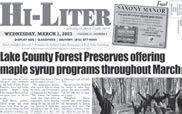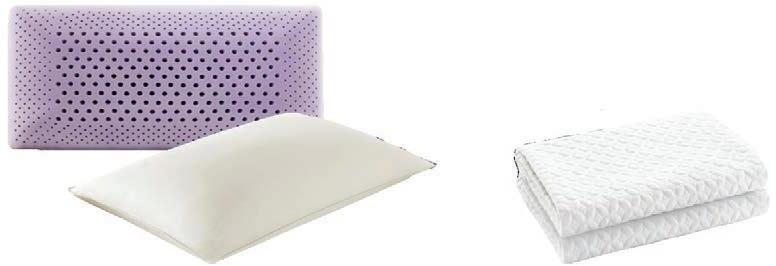

Mild seasonal weather prompts early opening for local conservation sites
McHenry County Conservation District reopened all district conservation sites, restrooms and parking lots for the season on Friday, Feb. 23, due to warmer temperatures. This is the earliest date on record for reopening.
“After last week’s warm temperatures, we know the public is ready to get out and enjoy the trails. Typically, sites are scheduled to open April 1, but looking at the long-range forecast, we have re-opened all sites a full five weeks early,” said Perry Weborg, Parks and Fleet Manager.
While many conservation areas remain open all winter long for cold-weather fun, there are a few that are only open to walk-in visitors in the colder months. The parking lots of these sites usually remain closed until April 1 or significant periods of mild
weather. These sites have previously been opened in March, but never as early as February.
The early opening of Conservation District sites provides the perfect opportunity to get out and play, whether it be biking the Prairie Trail, paddling Nippersink Creek, casting a line at Lake Atwood, or hiking the myriad of District trails. Sites are open sunrise to sunset. Horse trails remain closed. Find hundreds of reasons to get outside at www.MCCDistrict.org.
McHenry County Conservation District currently owns and protects over 25,700 acres of open space which provides wildlife habitat preservation, educational opportunities and recreational amenities for the citizens of McHenry County to enjoy.































Pritzker proposes over $2 billion in spending growth, backed by tax increases for corporations, sportsbooks
By Jerry Nowicki capitol News illiNoisBudget fills previously projected deficit with changes to tax code
Gov. JB Pritzker last week proposed growing state spending by over $2 billion in the upcoming fiscal year while making a handful of corporate, sports wagering and other tax changes to pay for the increase.
Pritzker’s plan, laid out to lawmakers during his annual budget address, does not alter or increase state income tax rates. But it would more than double the tax rate paid by sportsbooks on gross revenues and extend an existing cap on operating losses businesses can claim on taxes.
Those two changes would raise about $726 million in revenue, erasing much of what had been projected as an $891 million deficit for the upcoming fiscal year.
All told, Pritzker’s budget anticipates $52.9 billion in general revenue and $52.7 billion in spending for the state’s main discretionary spending account in the fiscal year that begins July 1. The proposal now goes to lawmakers, beginning the annual negotiating process that generally concludes in May.
“Now, I expect that some of you will want to spend more, and some of you will claim you want to spend less,” Pritzker said in his speech to lawmakers in the House chamber. “Know this: I am always open to good ideas that members of both parties have to more efficiently and effectively fulfill our obligations.”
The governor’s budget office is also projecting current-year revenues will come in $199 million above previous estimates. The state expects the current fiscal year to end with $52.2 billion in total revenues, far outpacing the $50.4 billion in authorized spending in last year’s budget.
When including a proposed $1.2 billion supplemental spending plan for the current year, next year’s budget proposal would spend about $750 million more than the current year.
Revenue changes
Pritzker’s spending plan calls for a total of about $1 billion in revenue he proposes generating in the up-
coming fiscal year through changes in the tax code or state operations. That includes $526 million by extending a cap on the amount of net operating losses that corporations can claim on taxes. Lawmakers created a $100,000 cap on such deductions in 2020, but it was set to expire in the 2025 tax year.
The proposal seeks to extend it while expanding the claimable losses to $500,000. The governor’s office estimated that over 90 percent of losses claimed by corporations will not be impacted.
Another major change would increase the sports gambling tax to 35 percent from 15 percent. That tax is applied to the total profits collected by sportsbooks and will bring in about $200 million, according to the governor’s office.
Since sports gambling revenues were originally earmarked for infrastructure projects, the governor’s office proposes dedicating the first 15 percent for that purpose while allocating the rest to the general revenue fund.
Other revenue changes include raising $101 million by capping a sales tax credit retailers are allowed to claim. Retailers receive a discount of 1.75 percent of the sales tax they collect as reimbursement for their efforts in collecting them. The governor’s change would allow retailers to claim a maximum of $1,000 per month. The change would generate another $85 million for local governments as well. That proposal drew rebuke from groups such as the Illinois Chamber of Commerce and the Illinois Retail Merchants Association.
The governor ’s office also proposed freeing up another $175 million in the general revenue fund by transferring some payments to public transit agencies to the road fund, which is separate from the state’s main discretionary spending account.
Since the road fund generally goes to infrastructure projects, that proposal was especially panned by the Transportation for Illinois Coalition, which is made up of several union, infrastruc-
ture and business groups.
The governor also proposed permanently eliminating the state’s 1 percent grocery tax. His office didn’t give further details, but when a one-year reprieve from the tax was passed in 2022, the state estimated it would save Illinois shoppers about $400 million. Because local governments receive those tax revenues, the state reimbursed them over two fiscal years. But neither the governor nor any budget documents outlined such a plan Wednesday.
This year ’s budget proposal leaves in place a statutory inflationary increase to the state’s standard deduction for the 2024 tax year but limits its increase. According to budget documents, the standard deduction—a specific dollar amount used to reduce a taxpayer’s adjusted gross income—will be capped at $2,550 as proposed by the governor. Capping the inflationary growth at one year instead of two would create $93 million in revenue, according to budget documents.
Republicans generally criticized the budget for relying on the revenue proposals which are not yet contained in law, criticizing the governor for taxing businesses to provide the revenues for his new spending proposals.
Education, human services funding
As he has done in previous years, Pritzker called for sizeable increases in education funding. But those proposed increases are substantially smaller than many advocates had hoped.
“Every single year I have been governor, we have increased our investments in education, because a quality education is the foundation of a good life and the cornerstone of a strong society,” Pritzker said.
For Pre-K-12 education, Pritzker proposed a roughly $450 million increase, or about 4.3 percent above current year spending. That’s about $200 million less than the Illinois State Board of Education had requested.
Included in Pritzker ’s plan is a $350 million increase in Evidence-Based Funding, a program enacted




in 2017 that adds new state money each year to the funding formula, focusing that money on the districts that need it most.
His plan also includes an additional $150 million to fund the second year of his “Smart Start Illinois” initiative to expand access to early childhood education. That program helped add more than 5,800 preschool seats in Illinois in its first year, with a goal of increasing by 20,000 over four years.
The budget proposal also includes an additional $10 million for career and technical education programs, as well as $13 million to fund a new state agency for early childhood department.
Noticeably absent from his proposal, however, is the $35 million that ISBE had requested for educational programs that target new migrant students and their families who have been arriving in Illinois.
For higher education, Pritzker’s proposed budget calls for a 2 percent increase, or $30.6 million, in operating expenses for public universities and community colleges, significantly less than the 5 percent increase the Illinois Board of Higher Education had requested.
Pritzker also proposed a $10 million increase in the Monetary Award Program, or MAP grants, the state’s basic needs-based financial aid program. That would bring the total amount available under that program to $711 million. IBHE had requested a $50 million increase.
Funding for homeless prevention programs would grow to $250 million under the plan, a $50 million increase. Funding for the state’s Department of Children and Family Services is slated to increase by $76 million, a sum that will allow the department hire an additional 392 positions aimed at reducing caseloads.
Migrant, noncitizen programs Pritzker had previously said he would ask lawmakers to
dedicate $182 million to address the influx of migrants from border states, particularly Texas. That sum was included in his proposal.
“I won’t pretend any of this is easy, but it would be irresponsible to do anything but come here, lay out the scope of the challenge, tell you what I think we need to do, and then work with you to make it happen,” Pritzker said of the state’s migrant response.
The governor ’s office is proposing to cut $110 million in general revenue funding for a pair of health care programs for noncitizens that became a lightning rod last year amid quickly rising costs. But when combined with other funding sources, including a $100 million federal match for emergency services, the total grows to $629 million, outpacing last year’s general revenue allocation of $550 million.
The Health Benefits for Immigrant Seniors and Adults programs provide state-funded health care to low-income noncitizens who are in Illinois without legal permission or who have green cards and are on a waiting period. That group is separate from many of the migrants being flown or bused to Illinois from Texas. Individuals seeking asylum in the U.S. more likely qualify for other preexisting state or federal benefits
Amid controversy last year as cost estimates continued to rise, lawmakers allocated $550 million in general revenue to the programs and gave Pritzker the authority to cap enrollment and put other cost-saving measures in place, including copays. The Healthy Illinois Coalition, a group of health care and immigrant advocates, issued a statement applauding the funding proposal.
“We recognize the real fiscal challenges facing the state, but urge both the General Assembly and the governor to pass a FY25 budget that fully funds the existing HBIA and HBIS programs as they currently exist in stat-
ute, with no caps and no copays,” Healthy Illinois Campaign Director Tovia Siegel said in a statement.
The programs remain a contention for Republicans including Senate Minority Leader John Curran, of Downers Grove, who referred to Pritzker’s policies as making Illinois a “noncitizen welfare state.”
In December, the state’s Department of Healthcare and Family Services, which oversees the programs, projected their total cost for the current year—including revenues outside of the general revenue fund—at about $773 million. That estimate, however, had been on a general downward trajectory over several months.
Pension changes
The spending plan includes fully funding the state’s $10.1 billion required pension payment in the upcoming fiscal year. But the governor also proposed altering the state’s so-called “pension ramp” in a way his administration hopes will be viewed positively by credit ratings agencies.
The proposal includes increasing the target funding percentage for pension funds to 100 percent, up from 90 percent, while adding another three years for the ramp to reach that point. The fully funded goal would be moved to fiscal year 2048, from FY 2045.
It would also call for increasing pension payments in 2030 and 2033 when outstanding general obligation debts are retired.
Eric Kim, head of state government ratings at Fitch Ratings, issued a statement Feb. 21 noting the plan “could help reduce risks associated with the state’s pension obligations and improve credit quality.”
“Ultimately, any rating implications will be based on Fitch’s review of the enacted budget and any related legislation, which could look materially different than the Governor’s proposals,” he said in the statement.
Bird volunteer instructors still needed
Volo Bog State Natural Area is still looking for at least 10 more classroom volunteers and six field trip support volunteers to help with this elementary school program. Volo Bog State Natural Area is partnering with Openlands to bring the Birds In My Neighborhood® program to children in school classrooms in Lake and McHenry County.
No experience or bird knowledge is required – just a love of birds and a desire to share with youngsters. More volunteers are needed to expand the program to more schools.
Birds in My Neighborhood® is a volunteer driven science-based program for grades 2 through 5 that helps students see nature in their community through the observation of birds. Volunteers help run the program by working with teachers to schedule two classroom visits and a field trip to a local natural area. New volunteers must attend trainings to participate in the program. Become a volunteer instructor
Commitment is 15-20 hours per season. And responsibilities include: Attend two training sessions, work with teacher to set the schedule for visits and field trip, and lead three visits with students: in-classroom lesson, bird walk in the schoolyard, and a field trip to a local nature area.
Provide field trip support
Commitment is 5-`0 hours per season. Responsibilities include: Attend the field trip tutorial, and attend at least one field trip to support volunteer instructors by chaperoning students and helping them find and identify birds.
Spring 2024 training schedule for Lake & McHenry County volunteers • Wednesday, March 6, 9:00 a.m. to 2:30 p.m. classroom and schoolyard tutorials at Volo Bog SNA
• Wednesday, March 20, 9:00 to 11:30 a.m., field trip tutorial at Rollins Savanna
For more information and to volunteer, contact Stacy Iwanicki at dnr.volobog@illisnois.gov or 815-3441294.

Lake County
Lake County Board members advocate for Capital Priorities Projects in Washington
While in Washington D.C. for the National Association of Counties Legislative Conference, Lake County Board Chair Sandy Hart and Legislative Committee Chair John Wasik met with several Illinois members of Congress to advocate for funding for Lake County’s 2024 Capital Priorities projects.
Lake County’s Capital Priorities are projects that could potentially be eligible for federal funding. The projects aim to improve public safety and transportation, spur economic development, provide clean water, mitigate flood-prone areas, and protect and enhance our natural environment.
“Our strong relationships with our Illinois federal legislators have successfully led to millions of dollars in funding for large infrastructure projects that are improving lives,” Hart said. “This funding has enabled us to address devastating flooding throughout Lake County, improve roadway safety, build new bike and pedestrian paths, and reduce
9-1-1 call transfers which will be facilitated through the new Regional Operations and Communications Facility.”
Chair Hart and Committee Chair
Wasik held meetings with the offices of Senators Dick Durbin and Tammy Duckworth, Congresswoman Jan Schakowsky, and Congressmen Bill Foster, Mike Quigley, and Brad Schneider.
“Every year, we work closely with our congressional representatives -- and visit all of their offices in Washington -- to support projects and services that benefit Lake County communities,” said John Wasik, Chair of the Lake County Legislative Committee and Lake County Board Member.
”This year, with a record amount of infrastructure dollars still available from multiple Biden Administration programs, we are even more sharply focused on funding the most impactful projects for all of our residents. We are incredibly thankful for the tremendous partnerships that we have with our federal legislators
and the funding they have helped bring to Lake County. We look forward to continuing working with them to find ways to bring funding back to Lake County.”
Lake County’s 2024 Capital Priorities features 13 projects totaling more than $357 million, some of which that are now fully funded with support of federal investments. Project highlights include the Cedar Lake Road project; construction of a solar power generation field and Electric Vehicle charging network on the Lake County Libertyville Campus; modifying the Sylvan Lake Dam in Mundelein; and a project to help ensure youth in the region have equal opportunities to participate in subsidized work-based learning, pre-apprenticeship, and apprenticeship programs to help them access quality jobs.
Lake County’s 2024 Capital Priorities booklet with all the listed projects is available online at https://www.lakecountyil.gov/4859/ Capital-Priorities.
19th Judicial Circuit Court awarding grants from Crime Victims Services Fund
Completed applications due by April 1
The Nineteenth Judicial Circuit’s Crime Victims Services Fund Committee anually provides grants to victims’ services programs as provided by law. Funds can be used to create new programming or enhance an agency’s current programming.
Grant funding is available to non-profit organizations with a 501(c)(3) status, local government agencies, and agencies providing services to the Nineteenth Judicial Circuit. The maximum annual individual grant amount will be $50,000. The number of grants and amounts awarded will be subject to available funding.
“I am honored to share that Zacharias Sexual Abuse Center and Prairie State Legal Services were each awarded funding for their proposals to provide services to crime victims and their families in Lake County. In 2023, the Nineteenth Judicial Circuit awarded $100,000 to these organizations. Additional monies are available to continue to assist agencies to sustain their existing programs or implement new services,” said Chief Judge Daniel B. Shanes.
Zacharias Sexual Abuse Center, or the ZCenter, is a 501(c)(3) organization that
Environmental/Natural History scholarship applications open
The Friends of Volo Bog and Friends of Moraine Hills State Park are offering a total of five scholarships for outstanding Illinois students interested in pursuing an environmental science or natural history career.
The Friends of Volo Bog has three $1,500 Scholarships that are awarded at two levels – Entering College and Continuing College.
Entering College scholarship
To be eligible for the Entering College scholarship, the applicant must have a permanent residency and attend a accredited Illinois high school in Lake, McHenry, Cook, DuPage, Will, Kendall or Kane County, have a minimum B average, and plan to attend an accredited college or university. The applicant should be planning to enter a career directly related to preserving the natural environment.
Continuing College scholarship
To be eligible for the Continuing College scholarship the applicant must be currently enrolled in an accredited college of university pursuing a degree directly related to preserving the natural environment. The applicant must have a permanent residence in Illinois, have graduated from an Illinois high school in Lake, McHenry, Cook, DuPage, Will, Kendall or Kane County, and currently hold a minimum B average in their college studies.
Recipients are determined by a review committee of Friends of Volo Bog. The Friends of Volo Bog is a notfor-profit 501(c)(3) organization, dedicated to promoting citizen awareness of the local natural heritage of Volo Bog State Natural Area, portions of which are dedicated to state nature preserves, and to preserving the same through
special events, educational and training programs, acquisitions of properties for such purposes and taking whatever steps deemed necessary to insure the continued care and preservation of Volo Bog State Natural Area as a natural site.
Applications are due by March 31 for the school year starting in the fall. Winners are announced in May. Find an application with complete instructions at www.friendsofvolobog.org.
The Friends of Moraine Hills State Park is offering two $2,000 scholarships to outstanding Illinois students interested in pursuing an environmental science or natural history career.
To be eligible for these ‘Entering College’ scholarships, the applicant must have a permanent residency in and be attending an accredited Illinois high school in McHenry or Lake County, have a minimum B average and plan to attend an accredited college or university.
The applicant should be planning to enter a career directly related to preserving the natural environment.
Applications are available at www.friendsofmoraine-
hillsstatepark.org and are due by April 30 for the school year starting in the fall.
Recipients are determined by a review committee of Friends of Moraine Hills State Park. The Friends of Moraine Hills State Park is a not-forprofit 501(c)(3) organization, dedicated to promoting citizen awareness of the local natural heritage of Moraine Hills State Park, portions of which are dedicated to state nature preserves, and to preserving the same through special events, educational and training programs, acquisitions of properties for such purposes and taking whatever steps deemed necessary to insure the continued care and preservation of Moraine Hills State Park.
provides survivors of sexual assault and their families with direct medical and legal advocacy services. Counselors and staff work to alleviate the trauma of sexual assault and abuse on survivors and to prevent re-traumatization as they heal. Prairie State Legal Services (PSLS) is a 501(c)(3) organization whose mission
is to ensure equal access to justice and fair treatment under the law by providing legal advice and representation, advocacy, education, and outreach that serve to protect basic human needs and enforce or uphold rights.
The full instructions of the Crime Victims’ Services Funding application are available on the website

at https://19thcircuitcourt. state.il.us/2312/Crime-Victims-Services-Funding-Application.
Completed applications are due no later than April 1, 2024, and grants will be awarded by May 1, 2024. Applications must be submitted via email to CrimeVictimsServicesFund@lakecountyil. gov.





a row, and first at IHSA Bowling sectionals.
Lake County Clerk announces increased access of early voting
County-wide
early voting begins on March 4
The Lake County Clerk’s Office is pleased to announce that early voting for the upcoming General Primary Election will be available county-wide starting Monday, March 4th. Lake County proudly provides voters with a multitude of convenient locations across the county where they can cast their ballots. Early voting offers an opportunity for individuals to have their say in shaping the future of our community at a time that best fits their schedule.
Lake County Clerk Anthony Vega is also proud to announce that the early voting locations located at Avon Township, Ela
Area Public Library, and Wayfarer Suite 106 in Highland Park will be added to the extended hour schedule to provide increased accessibility and flexibility for voters across Lake County. For a comprehensive list of early voting hours and locations, we encourage voters to see the image below or visit bit.ly/ LC_EarlyVoting. These resources will guide voters to their nearest polling location. For additional election information, please visit LakeCountyClerk.Info. You may also visit LakeVoterPower.Info for personalized voter information.
Volunteer opportunities available at Volo
Bog SNA and Moraine Hills
Docents at Volo Bog
State Natural Area & Moraine Hills State Park
Docents greet visitors in the Visitor Center, answering questions and offering information about our site and programs, as well as running the Friends of Volo Bog’s Tamarack Shop. Commitment is one weekend day per month for a minimum of one year. After the two training sessions, new docents shadow experienced docents for three sessions, then can sign up solo.
Training is on Saturdays, March 16 & 30 from 10 am—3 pm.
Weekend Bog Naturalists at Volo Bog
State Natural Area
Weekend Bog Naturalists lead two guided bog tours on one weekend day per month for a minimum commitment of one year. After the two-day training on March 16 & 30, weekend bog naturalists shadow three experienced WBNs then sign up to lead solo.
Trainings are on Saturdays, March 16 & 30 from 10 a.m. to 3 p.m. to provide background information about Volo Bog and how to work with the public.
Bluebird Monitors at Volo Bog SNA & Moraine Hills State Park
Bluebird Monitors check the progress of nesting birds in bird houses from midMarch through mid-August. This involves light to moderate walking through a variety of weather conditions. Monitors then turn in data at the end of the nesting season. Bluebird monitoring is ideal for individuals, friends, couples or small families. A minimum five-month commitment is necessary. New monitors are given assigned required readings and are then mentored by existing monitors.
Prairie & Native Gardeners at Volo Bog SNA & Moraine Hills State Park
State Park
Gardeners tend the native demonstration gardens throughout the parks beginning with spring clean-up in March. Each year, some new plants are planted followed by weed control (hand pulling) throughout the growing season. Fall may involve seed collecting. A minimum commitment of eight months (mid March – Mid November) takes the volunteer gardener through the complete growing season.
New Gardeners are asked to attend the kick-off meeting on March 27 from 10:30 a.m. to noon at Volo Bog State Natural Area, followed by cleanup burns.
Volunteers have a passion for nature and the environment and enjoy time outdoors. The ideal volunteer is a reliable self-starter and a motivated learner. Training and mentoring provide the information and skills needed.
To apply, contact Natural Resources Coordinator Stacy Iwanicki at 815-344-1294 or dnr.volobog@illinois.gov
Annual battery recycling event open until March 20
The McHenry County Department Health (MCDH) will be accepting single-use alkaline batteries for recycling thru March 20 at the Division of Environmental of Health office at 667 Ware Rd, Suite 110, Woodstock. Battery sizes AA, AAA, C, D and 9-volt from residential sources will be accepted at no cost to residents. Only single-use, non-rechargeable batteries will be accepted during this event.
Batteries may be dropped off Monday through Friday from 8 a.m. to 3:00 p.m. at the MCDH Division of En-
vironmental Health office located inside the McHenry County Administration Building.
MCDH is unable to accept any other types of recyclable materials or waste during this recycling program. To recycle other types of batteries such as lithium-ion cell phone, laptop, rechargeable drill or other small appliance rechargeable batteries, vehicle or etc., please review the McHenry County Green Guide for a list of recycling locations (fees may apply).
Batteries collected during this event will be shipped to
Cirba Solutions in Wixom, Michigan. Cirba Solutions is a U.S.-based battery recycler where batteries are separated by chemistry and recycled into materials like zinc and manganese concentrate, steel, paper and plastic. Recycling is an easy way to reduce waste from disposal in sanitary landfills, improve sustainability efforts and protect the environment. For more information, please visit the Solid Waste Program page or contact Solid Waste Manager Kelli Boeckmann at (815) 3344585.
Village of Richmond to receive grant from National Endowment for the Arts
The Village of Richmond is pleased to announce it has been approved by the National Endowment for the Arts (NEA) for a Grants for Arts Projects award of $10,000. This grant will support a public mural project downtown. In total, the NEA will award 958 Grants for Arts Projects awards totaling more than $27.1 million that were announced as part of its first round of fiscal year 2024 grants.

Pet of the week
Stark, is about 10 months old, neutered, up-todate on shots (incl. rabies), tested negative for heartworm and on preventative and microchipped. While walk-ins are welcome, adoptions are by appointments only to ensure we have the staff available to help adopters. For information and/ or to complete an online application, please visit www.saveapetil.org/adopt.
“The NEA is delighted to announce this grant to the Village of Richmond, which is helping contribute to the strength and well-being of the arts sector and local community,” said National Endowment for the Arts Chair Maria Rosario Jackson, PhD. “We are pleased to be able to support this community and help create an environment where all people have the opportunity to live artful lives.”
“This grant is not just an investment in art, it’s an in-
vestment in the soul of our community. These murals will bring together artists, residents, and visitors, creating a dialogue through the universal language of art. I could not be more thrilled.” said Village President Toni Wardanian.
This grant will help fund two public art mural projects and provide work opportunities for artists.
For more information on other projects included in the NEA’s grant announcement, visit arts.gov/news
Workforce Network seeking input for Workforce Development Plan
The McHenry County Workforce Network is looking for public input on its Workforce Development Plan.
Every four years, the state, regional and local workforce networks that were created by the federal Workforce Innovation and Opportunity Act are required to review their future workforce development strategies.
The Workforce Network runs a variety of programs and services for employers and job seekers needing as-
sistance in meeting the challenges of today’s job market. The network’s many programs share a common goal to create a skilled workforce to help increase economic prosperity.
The drafts of the McHenry County and the regional workforce development plans are available for review and comment by visiting https://www.mchenrycountyil.gov/departments/ workforce-network-board/ planning. The 30-day review period ends March 18.
PM&L Theatre holding auditions for Camelot next week
The tales of King Arthur, Guenevere, and the Knights of the Round Table come to life this season at PM&L Theatre, and we’re inviting you to play your part in bringing the legend of Camelot to our stage. Directed by Guy Finley, this production offers a unique opportunity to delve into the heart of Arthurian
lore with a fresh, innovative adaptation by David Lee, tailored for an intimate ensemble of eight talented actors. This isn’t just another production of the Lerner and Loewe classic. This adaptation strips back the grandeur to focus on the core narrative, offering a unique challenge and opportunity
for actors. With roles requiring versatility and a range of emotions, from the noble Arthur to the passionate Guenevere and the valiant Lancelot, each part presents a chance to showcase your talent in a production that promises to be both intimate and epic.
Audition details:
• Dates: Monday, March 5 and
Tuesday, March 6, starting at 7:00 p.m.
• Location: PM&L Theatre, 877 Main Street, Antioch
• Callbacks: Thursday, March 7, starting at 7 p.m.
• Full details, sign up and audition tips are on the Camelot audition page at https:// pmltheatre.com/event/camelot-
auditions/2024-03-04
Come prepared to have your singing range tested as well as sing a portion of a song from the show. Suggestions for songs are on the auditions page.
All roles are open for casting, regardless of gender or age, with a focus on finding the right fit for this unique production.













































Budget reaction: Retailers, municipalities
critical of Pritzker’s proposed tax changes
Comptroller praises ‘targeted approach’ as revenue proposals draw GOP, interest group ire
By Alex Abbeduto, Cole Longcor and Jerry Nowicki capitol News illiNoisThe annual process of negotiating the state budget kicked off last week with Gov. JB Pritzker proposing a $52.7 billion spending plan that includes hundreds of millions of dollars in new spending and tax increases, particularly for businesses.
The governor’s proposal to generate more than $1 billion in revenue through tax code changes—which would affect the state’s road fund, tax rates for retailers and funding to local governments—drew criticisms from industry groups such as the Illinois Retail Merchants Association, the Illinois Municipal League, and a coalition of transportation and union groups.
Republicans generally criticized the budget for relying on the revenue proposals which are not yet contained in law, faulting the governor for raising taxes to cover new spending.
Pritzker’s fellow Democrats were generally supportive of the plan, although factions of the party laid out their own priorities.
Interest groups
Some of the starkest criticisms of Pritzker’s proposal came from the advocacy groups for the organizations that will be hardest hit by his proposed revenue changes.
That includes the Illinois Municipal League, which called Pritzker’s plan to repeal a 1 percent statewide tax on grocery items “insulting,” because it does not include a corresponding reimbursement plan for local governments.
Lawmakers paused the tax for fiscal year 2023, but that move reimbursed municipalities for the $400 million not collected due to the temporary hiatus.
The IML particularly criticized this year’s proposal in light of continued underfunding of the state’s local government distributive fund.
Municipalities are currently getting less than 7 percent from the state’s income tax, although last year’s budget
contained a small increase.
That’s less than the 10 percent cut municipalities were getting prior to the passage of a state income tax hike in 2011.
“It’s yet another cut for local revenues at the same time municipalities are given more and more unfunded mandates and less and less cooperation from the state,” IML CEO Brad Cole said in a statement.
But Pritzker’s office said municipalities seeking to replace the tax money can issue grocery taxes at the local level instead.
Pritzker ’s office also pointed to another proposed change—a $1,000 monthly cap on a tax credit claimed by Illinois retailers for administering the state’s sales tax, which will generate an estimated $85 million for local governments and $101 million for the state.
But that measure drew the ire of the influential Illinois Retail Merchants Association.
“The retail discount is a partial reimbursement to the hard-working retailers across Illinois who collect sales taxes on behalf of state and local governments,” IRMA president and CEO Rob Karr said in a statement. “Contrary to claims, this proposal does not just target large retail stores but would impact retailers of all sizes, from independent grocers to the corner hardware store.”
The Transportation for Illinois Coalition, which advocates for transportation infrastructure investment, said it was “disappointed” with a separate proposal to move $175 million in public transit spending from the state’s general fund to its Road Fund – a source that’s required by law to fund transportation-related projects.
The coalition, which includes influential labor groups and trade associations among others, said the plan would “pit transportation needs against each other.” It estimated diverting the funds could cost the Road Fund $1 billion in possible improvements “over the next few years.”
Groups such as the Illinois Association of Rehabilitation
Facilities and the Community Behavioral Healthcare Association also noted that while they agreed with Pritzker’s plan in some areas, it lacked specific funding for their workforces.
IARF President and CEO Josh Evans said in a statement he was “deeply concerned” that Pritzker’s plan lacked pay increases for direct service providers for people with developmental disabilities, particularly as the state is moving to end a federal consent decree that provides court oversight of its system of care.
The Community Behavioral Healthcare Association and the Illinois Health and Hospital Association both praised Pritzker’s proposed changes to the state’s insurance code, a package of proposals aimed at controlling strategies that insurers use to reduce the amount of health care patients receive.
Republican response
The Republican response generally focused on the increase in proposed spending, particularly for programs serving noncitizens, and the tax increases needed to pay for it.
Pritzker ’s plan seeks to raise $526 million by extending a cap on the amount of net operating losses that corporations can claim on taxes. Lawmakers created a $100,000 cap on such deductions in 2020, but it was set to expire in the 2025 tax year. The proposal would cap that number at $500,000 for FY 25.
Pritzker proposed generating another $93 million by capping a standard deduction claimed by millions of Illinoisans at $2,550, rather than allowing it to increase to $2,775 as it was slated to, due to inflation.
“After last year’s session we made something very clear as a caucus – the actions taken by Democrats as it relates to an inflated budget would require tax increases,” House Republican Leader Tony McCombie said.
She said the fact that the budget requires several tax increases to meet proposed
spending is proof that they were right.
“We described how the state budget was built on onetime federal revenues and it would be the taxpayers that are on the hook to cover the shortfalls when those federal dollars run out,” she said. “Now we are dealing with that aftermath.”
Her concerns echoed those of Sen. John Curran, the Senate minority leader, who described Illinois’ policies as creating “a noncitizen welfare state.”
“Our priorities are simple this year: No tax increases, fund education, pay the pension bill, and fix agency dysfunction,” McCombie said. Members of the more conservative Freedom Caucus were also critical of the spending plan.
“We cannot support the expansion of new programs and new services when we have a massive budget hole,” Rep. Brad Halbrook, R-Shelbyville, said. “Further, we will absolutely stand against and condemn any proposed new fee or tax increase to fill this gap.”
Halbrook was particularly critical of the governor’s plan to dedicate another $182 million to services and housing programs for migrants bused or flown to the Chicago area from the nation’s southern border, particularly Texas. He did, however, say he supported the proposed elimination of the grocery tax.
Comptroller Mendoza
Comptroller Susana Mendoza called the governor’s plan “austere” and praised the governor’s “targeted approach” to the upcoming fiscal year 2025. “I think this is one of the best budgets I have ever seen in my 23 years in public service,” Mendoza said. “I have been super, super critical about making sure that we don’t overspend our means but honestly this budget was pretty much flat.”
Last year ’s budget allocated $50.4 billion in spending, or about 4.5 percent less than this year’s. But the governor’s proposal also included $1.2 billion in supplemental current-year spending, which would put FY25 about $750
million ahead of the previous year.
Mendoza said spending on programs including early childhood education – set for a $150 million increase – and the Department of Children and Family Services – set for a $76 million increase – are good investments. Mendoza added she supports the move to increase the pension funding goal from 90 percent to 100 percent and extend the state’s timeline for achieving that another three years, to fiscal year 2048.
“I’ve always said we should be at 100 percent funding. I think it’s a wonderful idea,” Mendoza said. “It’s why I believe that we need to pass my rainy-day legislation.”
Black Caucus Members of the Illinois Legislative Black Caucus held their annual response under the Capitol dome, calling the governor’s budget a starting point for negotiations.
Sen. Lakesia Collins, D-Chicago, said she thinks there is much in the proposal that could help Illinois move forward – but she indicated housing people will require a greater effort by the state. Collins said there’s “a lot of work to do.”
“We need home ownership,” Collins said. “We hear people talking about affordable housing, but it is not affordable. The average family is making $38,000 but living in a community where there’s $500,000 houses down the street – which drives up the market. We know this.”
Senator Robert Peters, D-Chicago, said members of the Black Caucus will continue to “push” and make taking care of unhoused people “more than a conversation.”
The proposed $50 million increase to “Home Illinois” –the governor ’s homelessness initiative – would support court-based rental assistance, an emergency and transitional housing program, rapid rehousing, shelter diversion techniques and the conversion of temporary shelters into permanent ones.
The Black Caucus is also interested in several other social issues that could need state appropriations, includ-
College news
University of Iowa fall semester Dean’s List honorees announced
The 2023 fall semester Dean’s List at the University of Iowa in Iowa City, IA, has been announced.
Local students included in the honoree list are:
• Mackenzie Carley of Antioch. College: College of Nursing; Program of study: Nursing; Classification: undergraduate - first year.
• Lila Heilig of Antioch. College: College of Liberal Arts and Sciences; Program of study: English; Classification: undergraduate - second year.
• Isabella DeMartini of Antioch. College: College of Education; Program of study: Education Studies and Human Relations; Classification: undergraduatethird year.
• Nicholas Nemkovich of
ing health care, violence prevention and K-12 and vocational education. Caucus members said housing and other issues disproportionately affect Black communities, but ultimately impact all Illinoisans.
Latino Caucus Members of the Illinois Legislative Latino Caucus said they are in favor of several programs in the proposed budget, such as a new child tax credit. The credit would be available to families with children under the age of three, offering 20 percent of the taxpayer’s state portion of the earned income tax credit.
The governor’s office estimated it would cost about $12 million—far below a $300 million credit sought by advocates.
But the caucus called for additional strides in funding health care.
“In order to achieve health equity in Illinois we should make additional investments in health,” Lilian Jiménez, D-Chicago, said. “I am confident that the governor is working to expand health care to all Illinoisians, and we want to make sure we’re working to ensure that Latinos including immigrants and refugees are included in that conversation.”
Pritzker ’s proposed budget includes $440 million in general revenues for a program providing state-funded health care to low-income noncitizens who would qualify for Medicaid if not for their immigration status.
While it’s a $110 million general revenue decrease from last year, advocates were placated by the fact that it included another $189 million in other funding, such as federal reimbursement for emergency services.
Sen. Celina Villanueva, D-Chicago, said the caucus will further advocate for violence prevention programs.
Pritzker’s budget materials highlighted $112 million in cannabis revenues that go partially toward violence prevention, as well as a $30 million state contribution to the Reimagining Public Safety Act, which was previously funded with federal investments.
Antioch. College: College of Liberal Arts and Sciences; Program of study: Enterprise Leadership; Classification: undergraduate - third year.
• Morgan Perry of Antioch. College: College of Liberal Arts and Sciences; Program of study: Criminology, Law and Justice; Classification: undergraduatethird year.
• Logan Chessick of Antioch. College: Tippie College of Business; Program of study: Business Analytics and Information Systems; Classification: undergraduate - fourth year.
• Joshua Nordhaus of Antioch. College: College of Liberal Arts and Sciences; Program of study: Data Science; Classification: undergraduate - fourth year.
MSOE announces fall Dean’s List recipients
Milwaukee School of Engineering congratulates students named to the Fall Semester 2023 Dean’s List.
• Ian Golvach of Antioch was named to the Dean’s List. He is pursuing a Bachelor of Science in Computer Science.
• Logan Knott of Richmond was named to the Dean’s List. He is pursuing a Bachelor of Science in Mechanical Engineering.
• Nathan Blanck of Antioch was named to the Dean’s List. He is pursuing a Bachelor of Science in Chemical and Biomolecular Engineering.
• Matthew Schultz of Antioch was named to the Dean’s List. He is pursuing a Bachelor of Science in Computer Science.
Students taking at least 12 credits in residence at MSOE with a cumulative GPA of 3.20 or higher are eligible for Dean’s List honors.
Lake County Sheriff’s arrest bulletin
The Lake County Sheriff’s Dept. reported the following arrests in Lake County. Suspects are considered innocent until proven guilty in a court of law.
Jan. 13
Larry Williams, 43, Round Lake, was cited for DUI – alcohol;
Jan. 14
Christopher Lowalski, 36, Waukegan, was cited for driving while license suspended, and driving with suspended registration;
Eric G. Hewitt, 39, Beach Park, was cited for domestic battery;
Kenenth F. Willis, 60, Beach Park, was cited for unlawful possession of a weapon.
Jan. 16
Diana Cortes, 23, Zion, was cited for DUI – alcohol;
David V. Silva, Jr., 45, Kenosha, WI, was cited for aggravated DUI, aggravated driving while license revoked, and no insurance;
Jan. 17
Blake W. Alexander, 37, Lake Villa, was cited for criminal damage to state supported property; Osvaldo Guzman, 20, Waukegan, was cited for DUI – alcohol;
Gustavo Benivides, 34, Waukegan, was cited for DUI – alcohol, and reckless driving; Bryan J. Thomas, 37, Milwaukee, WI, was cited for criminal trespass to motor vehicle and a warrant arrest: contempt of court (Kane County) DUI – alcohol (DeKalb County); Jan. 18
Joseph S. Bleuer, 31, Antioch, was cited for aggravated domestic battery;
Jesus Ortega, 49, Waukegan, was cited for a warrant arrest: DUI, failure to report to register as a sexual offender; Mario Alvarez, 35, Waukegan, was cited for DUI – alcohol and no driver’s license; Jan. 20
Harold W. Thatcher, 53, Zion, was cited for no driver’s license;
Isidiro Salazar, 33, Island Lake, was cited for DUI – alcohol;
Jan. 21
Luis A. Nieto Reyes, 21, Waukegan, was cited for DUI – alcohol;
Joaquin M. Vera, 41, Waukegan, was cited for DUI- alcohol; Jan. 22
Miguel A. Valle Ortega, 39, Kenosha, WI, was cited
for DUI – alcohol and no insurance; Jan. 23
Juvenile, was cited for a warrant arrest: unlawful possession of a firearm; Travis G. Prewitt, 45, Chicago, was cited for a warrant arrest: retail theft;
Roman Jan Zawisza, 61, Antioch, was cited for a warrant arrest: domestic battery;
Rafael D. Alday, 37, Waukegan, wa cited for DUI – alcohol, aggravated speeding (66 mph in 35 mph zone);
Jan. 24
Abrae D. Sawyers, 40, Gurnee, was cited for aggravated battery to a correctional officer;
Elizabeth A. Sandy, 37, Round Lake Heights, was cited for a warrant arrest: unlawful possession of a controlled substance;
Jeffery W. Rey, 51, Kenohsa, WI, was cited for DUI –alcohol;
Jose S. Rivera Rubio, 26, North Chicago, was cited for no driver’s license, driving with suspended registration and no insurance;
Jan. 25
Marquis L. Coleman, 33, Gurnee, was cited for driving while license revoked and no insurance;
Sheriff’s department announces traffic safety campaign results
The Lake County Sheriff’s Office participated in the “Drive Sober or Get Pulled Over” and “Click It or Ticket” enforcement effort from February 9 through 12. The goal was to keep impaired drivers off the roads and ensure more people buckle up and follow traffic safety laws. During this traffic safety campaign, sheriff’s deputies stopped 61 vehicles, arrested four motorists for driving without a valid driver’s license,
and issued 55 citations as follows: 31 citations for speeding, 4 citations for failure to wear a seatbelt, 1 citation for distracted driving, 19 citations for other traffic offenses.
This traffic safety campaign was made possible by federal highway safety funds administered by the Illinois Department of Transportation as part of the statewide “Drive Sober or Get Pulled Over” and Click It or Ticket” campaigns.
Jan. 26
Diego H. E. Reyes Bahamondes, 36, Nashville, TN, was cited for a warrant obtained: residential burglary and theft over $100,000;
Eric Hernandez, 33, Lake in the Hills, was cited for a warrant arrest: unlawful possession of a controlled substance;
Amanda M. Eckhoff, 35, Mt. Prospect, WI, was cited for DUI – alcohol;
Bernard J. O’Hallaren, 62, Wauconda, was cited for no driver’s license, fleeing to elude, and aggravated speeding (70 mph in 40 mph zone);
Jan. 27
Christian Caldeon, 30, Chicago, was cited for no driver’s license;
Alexander Gutierrez, 19, Gurnee, was cited for open transportation of alcohol, and unlawful possession of cannabis;
Eduardo Fajardo, 18, Waukegan, was cited for unlawful possession of a controlle substance, open transportation of alcohol, and unlawful possession of cannabis;
Quejuan T. Lewis, 27, Zion, was cited for drivng while license revoked and no insurance;
Ashley Robinson, 40, Libertyville, was cited for DUIalcohol and no insurance;
Karl Wadowski, 23, McHenry, was cited for unlawful possession of a controlled substance;
Miguel Alvarado Nunez, 39, Round Lake Park, was cited for DUI – alcohol;
Terrence W. Davis, 49, Gurnee, was cited for domestic battery; Jan. 28
Davaion T. Selvy, 22, Kenosha, WI, was cited for driving while license suspended, aggravated speeding (83 mph in 55 mph zone), suspended registration and no
insurance;
Inocencio Miguel-Calixtro, 40, North Chicago, was cited for driving while license suspended, aggravated speeding (82 mph in 55 mph zone), no insurance, and improper transportation of cannabis;
Ubaldo L. Sanchez-Ochoa, 26, Waukegan, was cited for DUI – drugs, and driving while license suspended;
Avion Dajae Deshaun-Flowler, 29, Chicago, was cited for driving while license suspended;
Robert L. Walker, 46, Milwaukee, WI, was cited for driving while license suspended;
Jan. 29
Michael L. Tingle, 54, Wauconda, was cited for a warrant obtained: retail theft;
Kristina M. Stewart, 39, Antioch, was cited for a warrant obtained: retail theft;
Shahid Ilahi, 67, Mundelein, was cited for a warrant arrest: battery;
Dawn L. Ashpole, 57, Fox Lake, was cited for DUI – alcohol;
Riley J. Emons, 19, West Allis, WI, was cited for aggravated speeding (73 mph in 45 mph zone);
Jan. 30
Christopher Quiroz, 26, Round Lake, was cited for a warrant arrest: violation of an order of protection;
Travarious K. McKelvy, 23, Gurnee, was cited for driving while license suspended and no insurance; Isaul E. Villaneuva-Arias, 27, Kenosha, WI, was cited for driving while license suspended, suspended registration and no insurance;
Jan. 31
Svyatoslav A. Molchanov, 44, Vernon Hills, was cited for a warrant arrest: contempt of court;
Joshua J. Smejkal, 36, Round Lake, was cited for a warrant arrest: driving while
license revoked (McHenry County); Feb. 1
Kenny A. Navarrette, 29, Island Lake, was cited for a warrant arrest: violation of an order of protection;
Manuel Cruz Fernandez, 36, Park City, was cited for no driver’s license;
Ubaldo L. Sanchez-Ochoa, 26, Waukegan, was cited for DUI – drugs, driving while license suspended and no insurance;
Francisco Cabezas-Cervantes, 33, Zion, was cited for DUI – alcohol;
Jaime Adame-Rivera, 47, Beach Park, was cited for DUI – alcohol, and open transportation of alcohol; Feb. 2
Joshua L. Rosendahl, 25, Ingleside, was cited for a warrant arrest: theft;
Jonathan Perez, 29, Beach Park, was cited for domestic battery;
Daniel P. McGovern, 31, Lake Zurich, was cited for violating an order of protection;
Joseph C. Petrancosta, 44, Grayslake, was cited for criminal trespass to residence;
Dwight D. Sander, Jr., 28, Gurnee, was cited for aggravated unlawful possession of a weapon by a felon, DUI –alcohol, aggravated speeding (82 mph in 55 mph zone), and no insurance;
Carlos Flores-Mejia, 20, Waukegan, was cited for no driver’s license;
Kyle R. Jernt, 31, Ingleside, was cited for DUI – alcohol;
Feb. 3
Ricardo A. Genaro, 24, Round Lake, was cited for driving while license revoked;
Antonio D. Riley, 50, Chicago, was cited for driving while license suspended and no insurance.







